Initiatives for Effective Use of Resources Back Number (2015)
Back to Latest Initiatives for Effective Use of Resources
Basic Approach
The Minebea Group recognizes that there are limits to the availability of resources used in its products, which include metals, plastics, and other raw materials, along with oil, natural gas, and other energy sources. Additionally, with regard to rare earth elements indispensable to the manufacture of electronics, since the number of countries producing and exporting the materials is limited, they are more susceptible to export restrictions.
We believe that the effective use of resources is critical to the continuation of our business activities, and to that end we are taking various management measures.
Results of FY2014 Initiatives
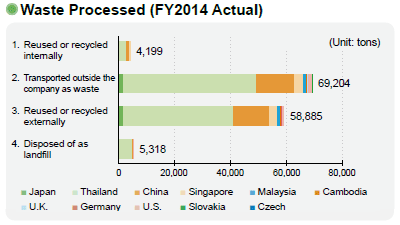 In FY2014, principal raw materials used by Minebea Group included approximately 85,913 tons of steel and 11,000 tons of resin, with the total amount of materials used about on par with the previous fiscal year.
In FY2014, principal raw materials used by Minebea Group included approximately 85,913 tons of steel and 11,000 tons of resin, with the total amount of materials used about on par with the previous fiscal year.
The amount of landfill waste generated by the Group's operations in FY2014 totaled 5,318 tons, an increase of 754 tons compared to FY2013. However, in terms of basic unit of production, the amount of landfill waste generated declined by 13% in FY2014 compared with FY2013.
At our mass production plants in Thailand and China, we are recycling water inside the plants to the greatest extent possible and prevent external emissions through our "Plant Wastewater Zero System." Water emissions from Group plants in FY2014 totaled 893,000 m3, an increase of 196,000 m3 compared with FY2013.

Initiatives at Business Sites
Effective Use of Rain and River Water (Thailand)
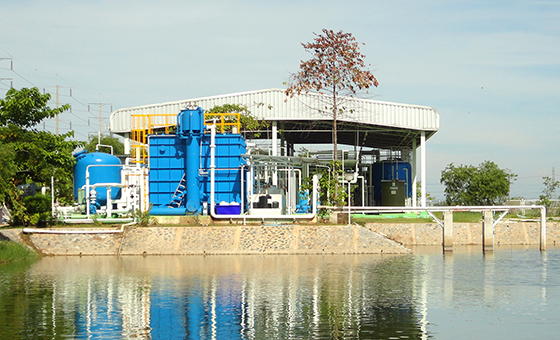
Rainwater reservoir and rainwater reuse system at the Bang Pa-in Plant
At our Thai plants, we collect rainwater in a reservoir on the plant grounds and purify it with rainwater reuse equipment for reuse as industrial water, thereby reducing the amount of tap water used.
In addition to this system, one of the Thai plants took further steps in FY2012 to substantially reduce tap water consumption by drawing water from the nearby Chiang Rak Noi Canal and purifying it to use as an alternative to tap water. With the start of this system, the plant has reduced both its tap water consumption and its water-related costs.
Conversion of Raw Kitchen Waste into Biogas (Thailand)
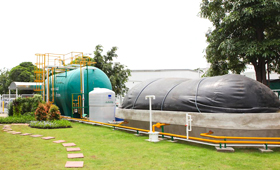
Biogas generation equipment
NMB-Minebea Thai is taking part in a project by the Thai Ministry of Energy to promote the recycling of raw food waste into biogas energy. Both the Bang Pa-in and the Lop Buri plants have installed biogas generation systems on site. The generated biogas, which boasts a low environmental footprint, is used as an alternative to LP gas for cooking meals in the cafeterias.
Recycling of Vials and Other Materials (domestic logistics warehouses)
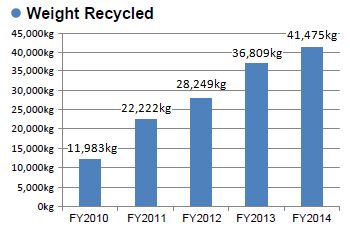
Since FY2010, the Minebea Group has sold as recyclable materials the polyethylene product containers (vials), stretch films, and polypropylene bands used in product deliveries to customers.
In FY2014, about 41 tons of vials, stretch films, and polypropylene bands were reprocessed into resin pellets and then recycled into planters and flower pots, as well as imitation trees.
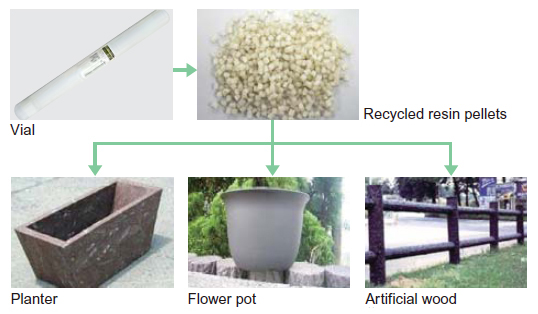
Desks, Chairs Made from Scrap Wood Donated to Elementary School (Thailand)
In FY2014, employees at NMB-Minebea Thai's Ayutthaya Plant made tables and chairs from scrap wood for nearby Wat Kra-sung Primary school's canteen. The Ayutthaya Plant continuously strives to make contributions to the community by effectively reusing its resources.

Chairs and tables donated to elementary school
Recycling Wood Packaging Waste (Thailand)
NMB-Minebea Thai's Lopburi Plant recycles pieces of wood waste from packaging materials. The wood was reused to make bulletin boards at bus stops on the company bus route, along with safety cabinets for the plant's guardhouse.

Bulletin boards made from wood packaging waste

Safety cabinets made from wood packaging waste
Future Issues and Goals
For FY2015, the Group's goal is to reduce the amount of waste ultimately disposed of as landfill by 10% per basic unit of output compared with FY2014.
Additionally, we will conduct research on the condition of waste already disposed of as landfill along with market analysis in an effort to reduce waste even further in the future.














